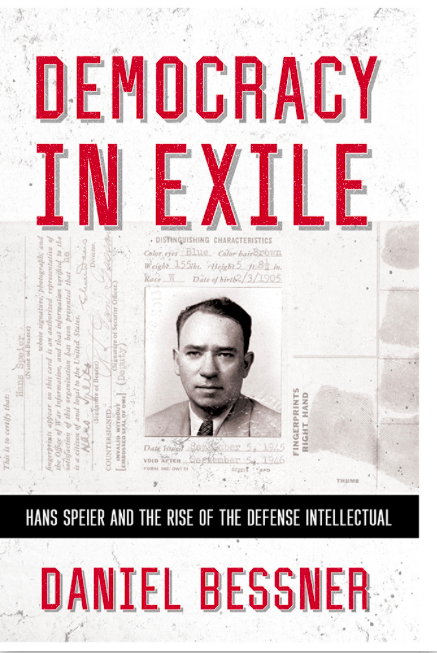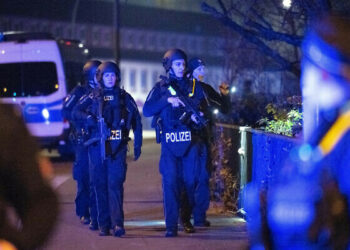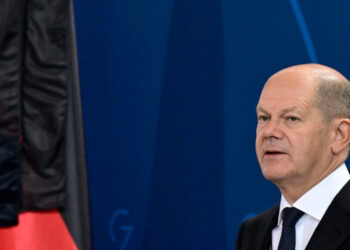Friction between expertise and democracy is at the heart of Daniel Bessner’s Democracy in Exile, the first full-length biography of Hans Speier, a German émigré and propaganda expert, who was among the most influential defense intellectuals of the early Cold War.
Bessner follows Speier through sociology seminar rooms in Heidelberg and Berlin in the 1920s, the “University in Exile” in New York City, traces his service as a propaganda expert with the Office of War Information, and RAND in the 1950s.
Speier is not only emblematic of a cohort that passed from German academia into institutions like the Palo Alto Center for the Advanced Study in the Behavioral Sciences. He was a central figure in this movement and a builder of institutions such as RAND and the Center itself. 
The political experience that defined Speier’s outlook was the collapse not just of Weimar democracy, but specifically of Social Democratic politics, and the victory of the Nazi Party. In the wake of this collapse, Speier dedicated his life to the practical work of defending democratic society, and for this reason was never happy in a purely academic setting. Experts like himself had a responsibility to power. In short, experts had to step in to save democracy from itself.
Bessner neither reduces Speier to a Strangelovian parody nor minimizes the antidemocratic transformations in U.S. governance, especially of foreign policy, in which Speier and his cohort were enthusiastic participants. It was, Bessner writes, “crisis [that] allowed [Speier] to resolve the tension between expertise and democracy by (temporarily) privileging the former over the latter.”
In the perpetual crisis that is our present, the nightmare of experts too successfully controlling policy may sound rather quaint, even nostalgic. Today more than at any time in the recent past, people of quite different political persuasions find it easy to believe that democracy has been fatally subverted by propaganda, that only the decisive intervention of something else — perhaps more democracy, a charismatic businessman, or the FBI — can correct the slow, wobbly gears of normal democratic governance. In such an environment, Speier’s compromises in the name of democracy are very much worth our attention.
Speier came to the United States from Germany in the months after the Nazis took power. The Nazis had been quick to shutter the Hochschule für Politik where Speier and many other politically involved and Social Democratic-leaning scholars worked and taught.
The institutional connections forged in the 1920s between the Hochschule and the Rockefeller Foundation and Carnegie Corporation provided exit paths for German scholars fleeing the Nazis. More than that, though, the Hochschule provided a model for the kinds of para-academic institutions in which defense intellectuals found homes in the U.S.
Thus RAND’s origins are to be found in part in the kinds of projects that American non-profits sought to support in Weimar Germany. Certainly, these connections eased Speier’s passage, via the so-called “University in Exile,” first to London and then to New York.
Speier spent his first years in the United States brandishing and burnishing his academic credentials as a sociologist of knowledge and a particular expert on propaganda. Speier’s academic pedigree as the first doctoral student of Karl Mannheim, founder of the sociology of knowledge, was a valuable resource in the U.S. academy.
Speier was eager to invest and re-invested all the cultural capital at his disposal in American markets. So it was precisely Speier’s Germanness that allowed him access to American professional sociology, just as it would to the foreign policy establishment when war finally arrived.
And it matters here that Speier was not Jewish. He left Germany that the Nazis were building because he had been a socialist, and because his wife was Jewish. That Speier was German Protestant no doubt eased his acceptance into U.S. foreign policy circles. It also caused hiccups, as when in 1942 the FBI significantly delayed his security clearance. They reasoned that, since he was not Jewish, had published on Karl Marx, and had fled the Nazis, he was likely a Communist. In fact, this was about as plausible as the tip they had received from a “disgruntled former employee” that Speier was a “strong national socialist.”
There was no typical émigré experience, and Speier’s story is a useful corrective to what has become perhaps the dominant image of wartime émigré intellectuals derived from the Frankfurt School. Unlike Max Horkheimer and Theodor Adorno, Speier adjusted himself to life in the United States after his arrival in 1933.
Rather than, like the Frankfurt School, elect to publish in German and remain as distinct as possible from intellectual life in the U.S., Speier eagerly turned his expertise in the German milieu into useful service to the U.S. government. Speier did not get along well with Horkheimer, and Bessner’s treatment of their head-butting is exemplary intellectual historical work, if painful to read because Speier appears neither generous nor kind.
Bessner’s archival work here has turned up many gems: in a manuscript of a 1952 report Speier produced for RAND on Horkheimer’s Studien über Autorität und Familie, we see him call the project “very ambitious and interesting,” and then cross out “interesting.” Franz Neumann, associated with the Frankfurt School, called Speier “a wily, very bright and technically extremely clever scoundrel.”
Speier’s first expertise was in propaganda. It was his academic work on this topic that got him a high-level entry into the war effort first analyzing Nazi propaganda, and then directing propaganda for the U.S. government into Germany. He continued to direct some U.S. propaganda efforts in Germany in the immediate postwar.
Speier’s return to Germany, as an employee of the U.S. government and in a position of some influence, produces some remarkable images. He wrote to his wife on seeing Berlin for the first time in ruins that “there remains nothing human about it. The water is polluted, it smells of corpses…houses, streets, districts in ruins. All people in civilian clothes among these mountains of ruins appear merely to deepen the nightmare. Seeing them, you almost hope that they are not human.”
Indeed, Germany after Adolf Hitler induced in Speier not pity but rage. Their disaster had struck civilization as a whole, and the sufferings of Germans had all been, Speier felt, self-inflicted through irresponsibility and immaturity. For Speier, the majority of German people had ultimately accepted Hitler: he had authority, which is something that can only be given, not taken. In so doing they destroyed the spiritual home that is Enlightenment. This was an exile much more serious and damaging for Speier than his departure from Germany itself.
This book might have been called Enlightenment in Exile. Indeed, it is clear that the relationship between democracy and Enlightenment — two over-freighted and essentially contested concepts — was among the fundamental questions of Speier’s life.
The Nazis destroyed any belief that a Kantian process of Enlightenment could take place through the unregulated public sphere. Marx’s claims that class structure and conflict would generate revolutionary — emancipatory — consciousness had been proved in Weimar to be just one more Enlightenment fantasy.
Social Democracy mattered for Speier precisely because the proletariat was the new home and hope for liberal values, so Speier experienced Nazi success as the dissolution of the connection between democratic practice and liberal — Enlightenment — values. The German people were to blame, but so too were experts like himself for failing to make themselves felt in political life.
Bessner always keeps this moral impulse of Speier’s in view. He was surely a keen self-promoter, but Speier’s life is interesting because his career as a defense intellectual had for him real moral content. This is to say that there were elements of liberal heritage that Speier never abandoned, elements that structured what appeared valuable to him.
Consider two games, both of which were run at RAND in the 1950s. The first was managed by the group of economists and mathematicians who brought game theory into strategic planning. Creating and progressively modifying a precisely calibrated simulation could, for instance, help to tell you where to put bomber bases so as to maximize the likelihood of success in a nuclear war. The whole point of these games — and “systems analysis” more generally — was to reduce ambiguity as much as possible in favor of calculation.
The goal was eminently scientific: to get a predictive grasp over the future (in this case, nuclear war). Speier, at that time the head of RAND’s Social Science Division, responded to the game theorists by developing a turn-based “politico-military game.” Individuals played the roles of different states — Russia, the United States, China, France, and so on — in a crisis. There was a referee, reference material, both secrecy and the possibility of exposure.
The prediction was not off the table, but the real goal was to develop understanding and judgment, even sympathetic imagination, in the players. Over the years, participants included George McBundy, Henry Kissinger, and Walt Rostow, among many others. Versions are still run at the Pentagon.
Speier’s model was a pedagogical game designed in the 1920s by his mentor and the founder of the sociology of knowledge, Karl Mannheim. There the goal had been to encourage in students the capacity to step outside and above the overheated political rhetoric of the Weimar years, to hold up to the same scientific light at once Nazi, Communist, Catholic, and Social Democratic demagoguery. Here the old German notion of Bildung, translated into a realm of technical expertise and to be sure attenuated, remains that which the intellectual, the scholar, is supposed to foster.
Speier and the game theorists cordially detested one another, but they shared ideological space as experts who believed that they knew better. Speier himself was left behind by the turn of the Cold War to developmentalist engagement with the Third World in the 1960s. No call came for him from Kennedy’s White House.
The prestige of defense intellectuals writ large never recovered from the debacle of the U.S. war in Vietnam. Bessner himself clearly feels that there is much justice in the critiques of Speier’s milieu made by C. Wright Mills and Noam Chomsky. Speier’s world can seem very far from ours. Yet his story leaves us with questions about the relationship between expert decision making and democracy that defy easy solution, and it is to Bessner’s credit that he is unwilling to draw hasty conclusions.
Certainly, Bessner is right that we ought to insist on the transparency and democratic accountability that Speier specifically rejected. Rather than values, which tend to look better the dustier they become, these must be techniques or mechanisms of government kept in working order and constantly tested against the world as it is.
Yet transparency, in and of itself, is not much. If you open a window, who will look through it? On what will they choose to focus? What is to be done about whatever they see, and by who? If Speier felt exiled from Enlightenment, some among his fellow exiles point out to us that technical control by elites over nature and, indeed, over human society regarded simply as part of the natural world, is itself a profoundly Enlightenment idea. A form of capital that draws value precisely from where we look is a reality, not a distant nightmare.
Speier stopped worrying about capitalism quite early in his intellectual development, but to borrow from Horkheimer, we should say that one who does not want to talk about capitalism should also keep quiet about democracy.
Ought scholarship be politically engaged? Can it escape such engagement? That Speier’s deeply held convictions about the responsibility of intellectuals led him into RAND’s sociopathy-by-design is all the more reason for us to consider his story with care. Speier looked at German academia and did not want to participate. He also did not want to be a party intellectual, a position that has no real analog in the contemporary U.S. (a party hack or loyalist pundit is something quite different).
Speier’s solution was to build institutions that would transcend party politics but also remain independent of the state itself, to present objective analyses directly to policymakers. Bessner’s account of Speier gives me the distinct impression that we are not closer today to creating institutions that can usefully claim to be non-partisan than were the doomed Social Democrats of the Hochschule in 1920s Berlin.
Indeed, academics in the United States today are much more conservative when it comes to institutional transformation than was Speier. This is in part perhaps because we are not so possessed by the memory of German academia embracing Hitler, and in part because any change seems likely only to weaken what protections currently exist for scholarship that strives for both objectivity and democratic relevance. Perhaps then the question Speier’s career poses for us is what kinds of institutions we can hope to build?





















